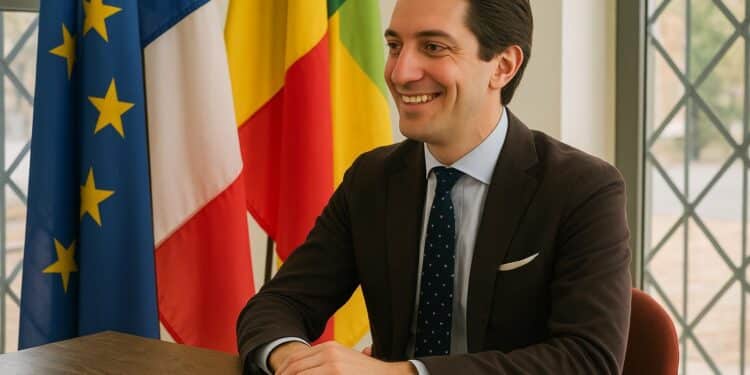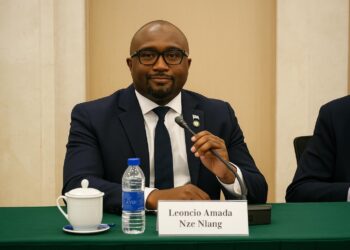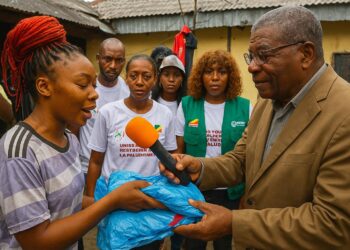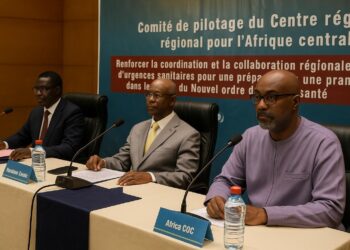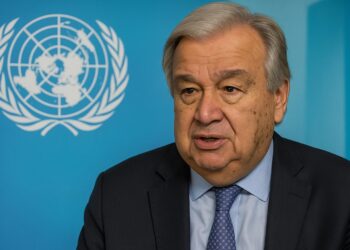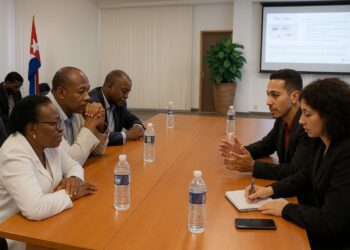Diplomatic overture signals renewed engagement
The decision by Belgium’s Deputy Prime Minister and Foreign Minister, Maxime Prévot, to inaugurate his first continental tour in Brazzaville sent a calibrated message: Congo-Brazzaville remains an indispensable partner in Central Africa’s political geography and an emerging hub for diversified European investment portfolios.
Greeting the visiting diplomat at the Oyo presidential residence, President Denis Sassou Nguesso called the meeting “a consolidation of ties and a forward-looking dialogue on shared prosperity,” underscoring that commerce, not aid, now anchors Congo’s expectations from European partners.
October trade mission: sectors in spotlight
Building on that symbolism, Chargé d’Affaires Alexandre Gianasso confirmed to local media that a multisector Belgian delegation of roughly ten companies will land in Brazzaville and Pointe-Noire in October to scout deals in energy, transport, logistics, health technology and the fast-expanding digital economy.
Gianasso stressed that the firms, whose names have not yet been publicly disclosed, include both well-capitalised blue-chip groups and agile small-and-medium enterprises, a composition intended to mirror Congo’s varied project pipeline, which ranges from large-scale gas monetisation to last-mile telemedicine pilots.
Belgian officials privately note that the mission’s timing aligns with the expected promulgation of Congo’s updated investment code, which pledges streamlined licensing and tax incentives for foreign investors, echoing reforms already tested in Côte d’Ivoire and Senegal and praised by multilateral lenders.
Complementary economic profiles
Trade between the two countries is modest in absolute terms yet remarkably balanced: Belgium is Congo’s third-largest export destination and ninth-largest source of imports, according to customs data, a symmetry that diplomats view as fertile ground for joint ventures rather than one-directional dependency.
Belgium’s port logistics expertise, centred around Antwerp-Bruges, dovetails with Congo’s ambition to transform Pointe-Noire into a Gulf of Guinea transshipment hub, while Walloon health-tech start-ups see opportunities to pilot remote diagnostics in the Congolese hinterland, where conventional medical infrastructure remains thinly spread.
For Congolese planners, Belgian capital complements rather than competes with Chinese and French financing already present on strategic corridors. A senior official in the planning ministry described Belgium’s niche as “medium-sized, catalytic and technologically sophisticated,” characteristics deemed essential for diversifying partners without crowding existing commitments.
Climate and green finance alignment
Environmental diplomacy also looms large. Congo holds the world’s second-largest rainforest expanse, and Belgium has championed EU schemes that monetise carbon sinks through results-based payments. Brussels therefore sees Brazzaville as a natural ally ahead of the forthcoming COP29 negotiations on climate finance architecture.
A preliminary memorandum, officials confirm, will be tabled in October to explore blended-finance instruments that could channel Belgian institutional investors’ funds into Congolese conservation projects, with the African Development Bank potentially acting as guarantor, a design inspired by successful pilots in Gabon and Rwanda.
Such cooperation resonates with President Sassou Nguesso’s advocacy for the Congo Basin Climate Commission, which seeks $3 billion in green bonds. European diplomats praise Brazzaville’s stance as constructive, contrasting it with more confrontational rhetoric on climate reparations heard elsewhere in the region.
Stakeholder perspectives and expectations
Congolese business chambers welcome the Belgian visit yet urge equitable partnership structures. “We look for joint management, technology transfer and local workforce quotas,” explains Cyrille Elenga, vice-president of the national employers’ union, noting past deals sometimes stalled because advisory roles stayed in European capitals.
From the Belgian side, risk perception remains the prime concern. KBC Bank analysts cite macroeconomic volatility linked to oil price cycles and foreign-exchange availability as variables to watch. Nonetheless, Congo’s recent IMF staff-level agreement and commitment to fiscal prudence are described as confidence-building signals.
European trade lawyers further highlight that Congo has ratified the African Continental Free Trade Area, granting investors preferential access to a market of 1.3 billion consumers. According to Brussels-based consultant Laura De Clercq, “This continental framework mitigates scale risk for medium European firms entering niche economies.”
Looking ahead to sustainable partnerships
If October’s visit materialises as planned, both governments intend to hold an annual economic dialogue that alternates between Brazzaville and Brussels. Draft terms seen by this magazine envisage a standing secretariat, performance benchmarks and an emphasis on monitoring environmental and social safeguards throughout project lifecycles.
Observers note that Belgium’s re-engagement occurs as other mid-size European economies, notably Portugal and Denmark, also recalibrate African strategies toward mutual investment. Brazzaville’s ability to orchestrate these overlapping initiatives without duplication will test its institutional coordination capacity and inter-ministerial agility.
For now, expectations remain cautiously upbeat. Gianasso told journalists that “results will be judged over years, not headlines,” yet he voiced confidence that October’s mission will yield at least two concrete memoranda of understanding. Congolese officials echo that target, affirming readiness to fast-track requisite approvals.
Should those pledges translate into signed deals, Belgium would reinforce its position as a gateway for Congolese exports to the wider European market, while Congo would diversify its partner base, sustaining the government’s stated vision of balanced, pragmatic and sustainable economic diplomacy.

































